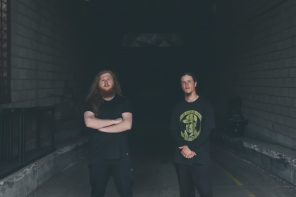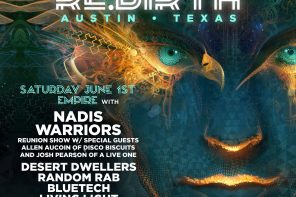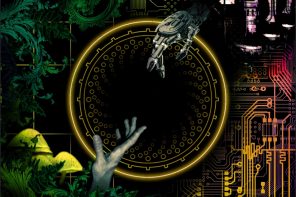
The wild West Coast of Humboldt county gets whomped out without a doubt from time to time, with the non-stop assault of DJs that frequent Humboldt County from all over the world. However, the night of August 15th would offer something a bit more unique. As computer based performances are becoming the most popular format for DJ’s on the scene, its nice to see some acts that embrace the unique sound and live playability of using hardware. The bass addicted duo Datgrrl and Zapper are more than willing to set up their arsenal of drum machines, synths and samplers for appreciative fans, and have the ability to tweak their all-original sets to custom fit the different vibes of the dance floor… Live. I, myself am musically dedicated to avoiding computers as much as possible, and when I heard that the pair were coming to town for local DJ Psy Fi’s birfday, accompanying Dubstep DJ’s Mykies McFilthy and AntiSerum, I made sure I could get an interview for LiS. Throw these acts into a Western cowboy themed atmosphere in one of the classier pubs in town, mix in a brand new set of Void subs, and it was sure to be a banger fit for the end of summer. The following is an almost precise transcript of my conversation with both Zapper and Datgrrl outside of Humbrews before the show.
The Doctor of Rage discussing music and gear with Zapper Live PA (myspace)
LiS: It was challenging to find some recorded tracks of yours online that weren’t live recordings from your performances. Have you ever put out an album of studio recorded tracks?
Zapper: I have been thinking of recording my tracks in a studio, but it involves recording each piece individually to let the track develop. All the highs and vocals and elements come together in their own little parts, and then I would reconstruct them all in Ableton.
LIS: So you are leaning towards using a computer for recording, but you’re not thinking of turning to a computer for live performances, right?
Zapper: That’s right, that’s always been the case.
LIS: Is that out of principal?
Zapper: Yeah, kind of. Computers don’t have the playability to me, I like the instant gratification of hardware. It’s right there in front of you. You click it, you press the button, you hear it, right? No matter how many controllers, no matter what you do in Ableton you don’t have that instant gratification. Or you have a complex issue of routing it all out.
it, right? No matter how many controllers, no matter what you do in Ableton you don’t have that instant gratification. Or you have a complex issue of routing it all out.
LIS: Its got to be tempting to make that switch to a computer with the amount of gear you have to take around and set up each night.
Zapper: Yeah,it’s tempting, but you know, I’ve created a niche with what I am doing. I am known for doing hardware, so that’s what I’ve been doing. I do have a dream to get a fuckin huge touch screen, similar to a giant i-Pad, but PC based so I can tap into my computer. Maybe not even using Ableton. I would use a sequencer to control my Virus, because the biggest problem I am having right now is recording my modulations, because currently I have to do them all by hand live and cannot loop them.
LIS: Have you ever gone into the guts of any of the gear to customize the circuitry?
Zapper: No, I’ve never gone into them to adjust things in the circuits, but I have done some self repairs on different things, like for instance, taking apart and replacing some stuff on the Roland SP-808… but not much more than that.
LIS: Why was it you first got into hardware, and what were some of the first pieces you got when you started making music?
Zapper: Oh yeah, dude check this out: So I grew up in a small redneck town of Quincy, CA in the middle of nowhere, and come from the drumming, death metal, punk rock background. I went out to Burning Man in 1997, I was 17 years old, and heard some techno music for the very first time. I was like what de’ fuck is this music, it made no sense and blew my mind. There were no musicians on stage, I just saw guys playing records, and saw Goa Gil playing his dat recorder, and was like what the hell? When I came back to reality, I was like how the hell do you make techno? Looking through my father’s ‘Musician’s Friend’ catalog, I saw the Roland MC303 and the tagline: “all you need to make techno in one box!” And it clicked, drum machines, synthesizers, duh… I wanted to make music, not just spin records, I wanted to make it live. So my first piece of gear, and I still love it, was a Roland MC 505. It’s fuckin sick, you can mega-mix features and do everything you need to make techno. It was ’99 or 2000 when I got that piece, and for the time had extremely adequate sound and capabilities. Today it may sound a little dated, but if you can rock it right I would advise anybody out there to get a 505. (Roland’s Site)
LIS: Would you say seeing Goa Gil was most influential on your decision to start producing music? Who were some of your other musical influences?
Zapper: 1997… Goa Gil…Burning Man… that was definitely the one that flipped my wig. It was real psychedelic and it made no sense; he was playing off a dat recorder, like, taking VHS looking things and slamming them into this thing, which was super confusing. Some of the others, like Prodigy and Nine Inch Nails, were super influential as far as that industrial sound.
LIS: That makes sense to me, that you now play really heavy bass music with obvious dubstep influences, which has that industrial vibe. How would you describe how your music has evolved over the 10 or so years you have been making beats?
Zapper: It has become a lot more heavy. I started doing this kinda techno, on a cutesie kinda level.
LIS: Kinda like rave music?
Zapper: Yeah I was borrowing more from like psychedelic trance and it wasn’t until around 2004 that I started to wrap my head around the break beat scene and wanted to get more into making this bassy break style music. Again, burning man being super influential because it was the time that this style was becoming popular. When I went home I wanted to get behind the science of it, and that has kinda evolved into what I play now.
LIS: Being live oriented, have you ever thought about playing with live instruments accompanying you, kinda getting that EOTO or Sound Tribe fusion of live and electronic?
Zapper: Yeah I always had this dream of playing a banjo live along with it, right? Nah, I just got so much going on in my tracks that I couldn’t fit another instrument in. I’d be down to do some cool jam sessions with people. But as far as making it part of my act I think I got too much going right now.
LIS: As of now what is your favorite, go-to piece of hardware in your arsenal right now?
Zapper: My favorite piece of gear right now is the Axis Virus TI. I used to have the smaller Virus Snow, which was too small with only 4 parts. I had to upgrade to the Ti which has 16 parts and 26 knobs so I can have that instant gratification of the hardware and don’t have to mess around with all the little chicklet buttons on the snow. You’ll see it on the dance floor tonight.
 LIS: About the dance floor, earlier tonight on the phone you said you were excited for the show in Arcata because the dance floor is always so pure. Can you elaborate on that a little?
LIS: About the dance floor, earlier tonight on the phone you said you were excited for the show in Arcata because the dance floor is always so pure. Can you elaborate on that a little?
Zapper: Yeah sure man, every place is different, but I like playing places like Arcata because I don’t feel everyone is so saturated. When I play places like San Francisco.. everyone has heard dubstep and all the sounds and it becomes almost more competitive. Here, and places like here, like Hawaii, I have a few other favorite dance floors, ya know? I can get away with a little bit more; I can push limits. I don’t have to fit into genres as much for the dance floor to react. It’s a less pretentious dance floor I guess you could say.
LIS: I can definitely relate to the difference in the crowd action when I go down to the bay.
Zapper: Yeah it’s like they have these preconceptions of what something should be.
LIS: In general what is your favorite place to play music, like clubs, festivals, private parties?
Zapper: Well, some of my favorite sets have been in Hawaii because I could take it to an almost down tempo level where it got super spacey and the crowd was fine with it, but as far as my favorite setting to play it’s illegal parties. Renegade parties, outdoor parties. If you have to drive an hour to party then you came to party. People didn’t come to pick up chicks or whatever else, they came to party.
LIS: Name the absolute best party you played in all your 10 years of performing live.
Zapper: Oh yeah, Metro and Trekkas Sound System in North Italy in 2008. It was by far the most epic party I have played. There were 700 people and a wall of sound, I mean a WALL. I went over there with this agenda, like I wanted to push dubstep on them, but the first renegade party I played there were 400 people on the dance floor ready to go. When you give them dubstep, they ya know yawn. It was too slow, they are used to what we call hairstyle and didn’t care about the baseline, so I found this happy medium. The wobble, and the 4-4. I took the dubstep formulas from my music over a 4-4 kick. It was at that party that I found my formula.
LIS: What specifically made it your favorite party?
Zapper: My favorite thing about it was the sheer size, and everything I went through to be able to play that party. It was a long time dream coming true to be able to make it over to France and to get the connections to even be able to play.
 A few words with Datgrrl (myspace)
A few words with Datgrrl (myspace)
LIS: How did you two (Zapper and Datgrrl) meet and what’s your relation… er… what’s your deal?
Datgrrl: (laughing) We met at a party in LA and he has been following me ever since. (laughing by all) No, but I plug my mixer into his sound so we are now… interdependent.
LIS: How long have you been playing your hardware sets and why did you get into hardware?
Datgrrl: Well I started as an emcee and was also doing computer music on Reason, ya know, but could never finish tracks. I never felt I was playing out, it was like I had 20 unfinished tracks on Reason and then I got my Radias three years ago, and then the EMX-1, and that machine really transformed my set in so many ways. There are pros and cons with having all hardware, like I’m not usually the person to play an impromptu set at after parties because of all the set up, but a reward is that every time I perform its different. What I love about playing live is all the little mistakes and glitches that happen that remind people that its a real person playing, and those moments when you have a comeback and really rock your shit and play it… play it LIVE. I also have a theatre comedy background so I do like sitting and producing something and going up with it ready to go, and knowing what its going to sound like. The variables are there but the pros are so fucking rewarding.
LIS: Can you describe “Slutstep” for me in your words?
Datgrrl: Oh that’s awesome. Slutty hip hop vocals with a dubstep beat or a breakbeat. I try to switch up the beat, a lot of people think that I’m all dubstep because they think anything with a wobble is. It tends to have the elements: the wobble, that bass that gets people going and the slutty lyrics. I used to think the lyrics would only get the girls going but I’ve played shows with a lot of guys there too and they were reacting. But we used to joke that I’ve played shows where there were girls going at it and making out with each other.
LIS: Awesome… What’s your favorite place to play, what’s the best setting for you, and what makes it the best to play and feel happy playing?
Datgrrl: Well, the outdoor setting is the most rewarding but the most work. One of my favorite sets I’ve played was in Hawaii on the beach where I had to hike my gear out a mile through the rocks. I was thinking ‘what am I doing’, and I had really bad laptop envy at that time. But it really turned out to be the most incredible set on the beach as the sun came up, and all the people were really appreciative. On the other hand, I also like doing shows with a sound guy, like tonight we have a sound person there with you checking levels, that’s the other side of it. It’s the shit too.
LIS: I really wanted to get an interview with you because I am into producing music live, without laptops, with our Hardware Heroes project, and love the way you guys share the philosophy.
Datgrrl: That’s really good to see, because some people tell me that this is going to fade out, and ya know it could go either way; with everyone using Serrato and computers, I think it could make hardware more valuable because it is different.
[nggallery id=102]




